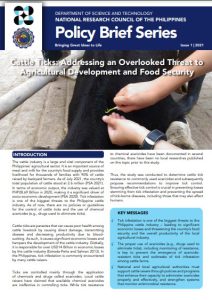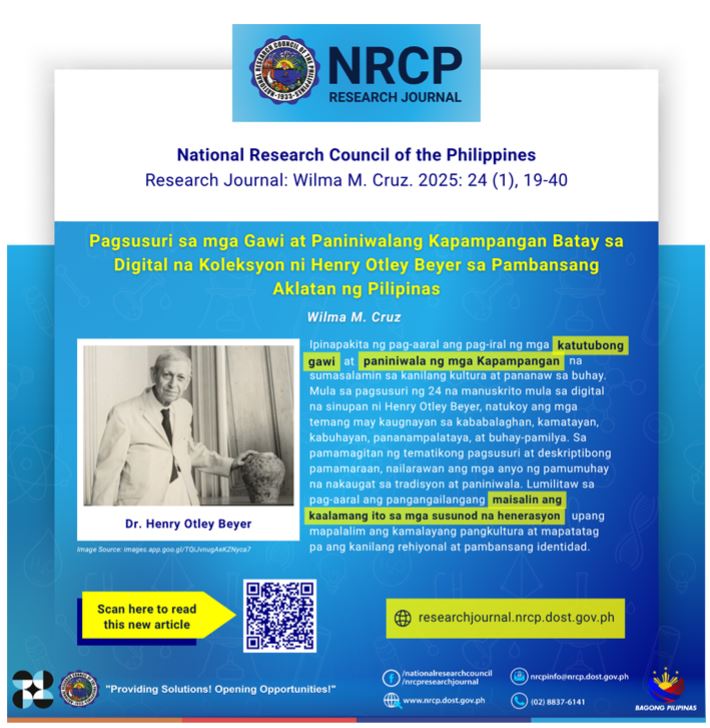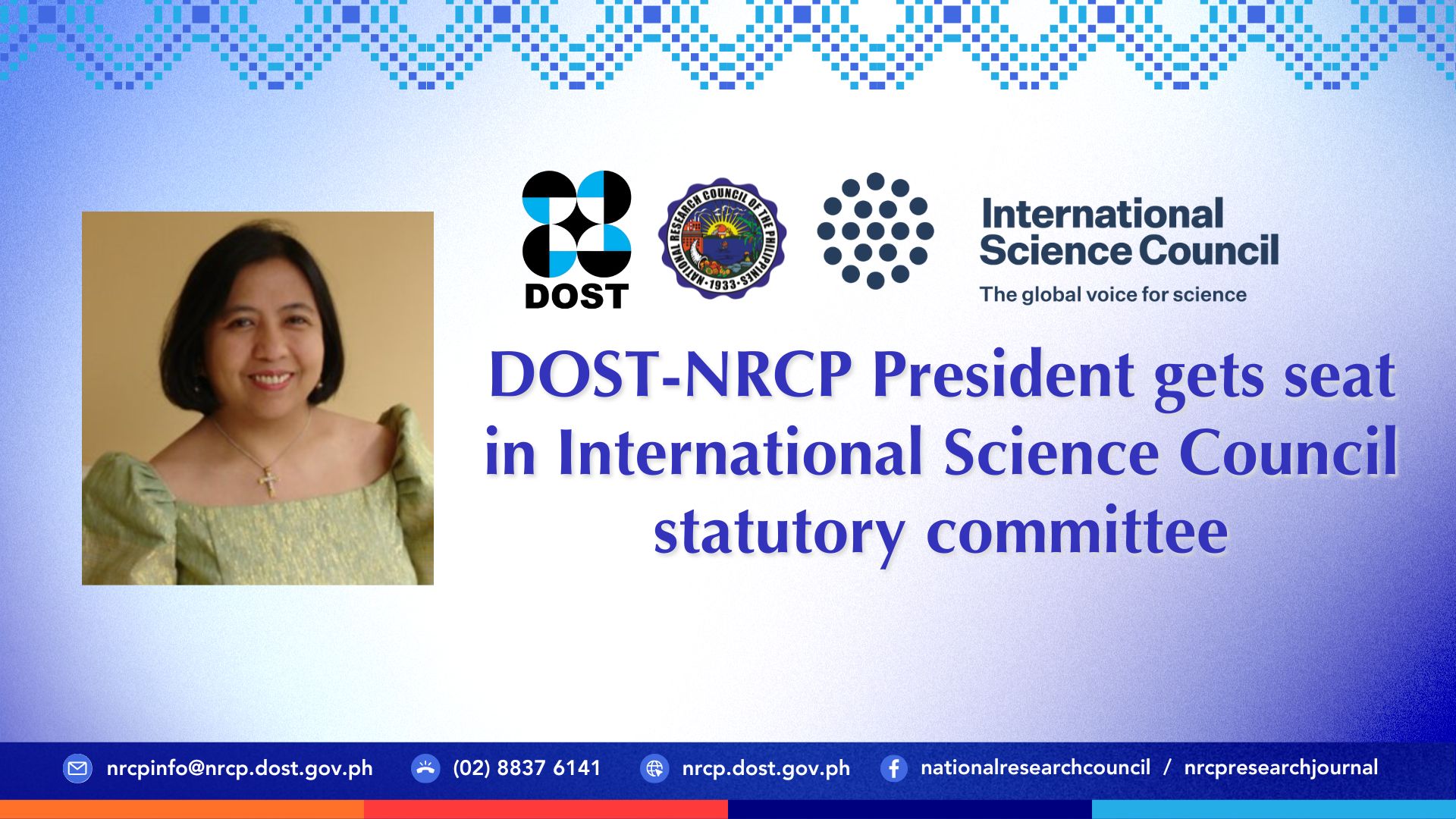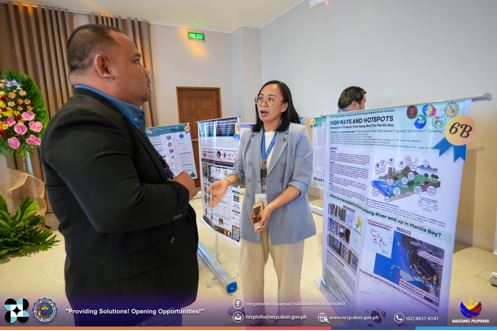
The National Science and Technology Week Celebration is approaching and as part of the said celebration, the Department of Science and Technology-National Research Council of the Philippines (DOST-NRCP) in partnership with the DOST Region 1, successfully conducted the second wave of the NRCP Regional Basic Research Caravan on 27th of October 2021 via Zoom with 176 attendees (96 females and 82 males) from the different sectors.
The caravan was divided into three parts, (1) Communicating Basic Research Results to the People, (2) LGU evidence-based policymaking, and (3) Enhancing Science culture in the Region. In the first part, one of the NRCP research “Cattle ticks resistance against multiple chemical acaricides” conducted by Dr. Remil Galay, Secretary, NRCP Division XIII highlighted one of the adjacent problems in the agricultural sector in Northern Luzon. It provided an overview of the emerging problem in the cattle industry which is the cattle tick infestation. In the study, it was found that ticks have a negative effect on the health of cattle and could also be the vector of infectious diseases that could easily be transmitted to humans.

Dr. Rio John Ducusin, Chair of NRCP Division XIII provided an overview of the current status of the cattle industry in the country as well as how ticks became an enemy of cattle and how it is difficult to eradicate.

Dr. Galay elaborated on the negative effect of ticks (Rhipiephalus (Boophilus) microplus) in cattle in Northern Luzon, particularly on the growing resistance to acaricide that made the eradication of tick infestation difficult. Ticks can have direct damage that will decrease cattle productivity through blood-sucking habits. He also mentioned that due to the infestation brought about by cattle ticks, there could be an economic loss of 14 to 18 Billion USD since in every 1 tick 0.6-0.9 live weights are lost or 8.9ml milk is lost. It was also found that there are no existing policies recorded on controlling the tick infestation in Northern Luzon which has become a big threat to the Philippine Cattle Industry. Regions 1, 2, and CAR were the pilot study sites. Only one province, La Union, was found to have no tick infestation occurrence. Dr. Galay commended this province because of their good management practice that led to no infestation.

A Larvae Packet Test was conducted involving three (3) chemicals tested namely, Amitraz, Cypermethrin, and Ivermectin. Findings showed that Ivermectin has the lowest mortality rate of 93% to 100% followed by Amitraz with 91% to 100% and Cypermethrin with 82% to 100%. As an overall result, it was found that none of the tested farms have resistance to ticks against amitraz, some farms are resistant to cypermethrin and there is low mortality using ivermectin.

During the open forum several important points were discussed including: (1) The availability of effective acaricide; (2) The importance of rotational grazing in minimizing the spread of cattle ticks; (3) the need for expert advice on the appropriate use of acaricide; (4) the use of other options such as herbal acaricide and anti-tick vaccine which is already used in the USA to control and prevent the spread of ticks; and (5) A call on immediate action to the tick problem.
Dr. Galay identified policy recommendations, as follows:
1. Formulate national policies and guidelines regarding the proper use of chemical acaricides, including monitoring the emergence of antimicrobial resistance.
2.Under a One Health approach, strengthen national and local agricultural systems responsible for the manufacturing or importation, distribution, administration, and monitoring of chemical acaricides for cattle raising. 3.Raise awareness among cattle industry stakeholders of effective strategies to reduce tick infestation through national and local forums, development of information, education and communication materials for end-users, and targeted communication campaigns.
4.Enhance the knowledge and skills of cattle raisers regarding the proper use of chemical acaricides for tick control through training programs and expert advice from veterinarians.
5.Generate local research and evidence to inform future policy directions and priorities.
“Adoption of these policy recommendation is vital to prevent the widespread resistance of ticks to the acaricides and outbreaks of infestation among cattle farms, thus, safeguarding this important sector of the life stocking as well as food security”, Dr. Michelle Grace Paraso, added.


For the 2nd part of the Regional Basic Research Caravan, experts from Don Mariano Marcos State University (DMMSU), the Provincial Government of Ilocos Norte and Pangasinan shared inputs and ideas about the recent practices that their provinces and universities are doing about the cattle industry. Dr. Jimilee Garcia, of DMMSU commended the researcher on this type of research study that could also help their cattle farmers. She also said that maybe the factors that affect the no existence of cattle ticks in their area which is La Union is because of the farming practices of their farmers that when they saw a single presence of ticks in their cattle they immediately removed it. Dr. CF Omar Domingo of DMMSU asked what motivates Dr. Galay to use the Larval Packet Test for assessing the cattle ticks. He also asked if it is possible to amend or create a policy for managing cattle ticks.
Lastly, NRCP promotes the different services it can provide to the public in relation to enhancing science culture in the regions. Different programs such as Research & Development Leadership (RDLead) program and NRCP Science and Technology Experts Pool (NSTEP) were presented, and different invitations were shown to collaborate.
This Regional Basic Research Caravan in partnership with DOST Region 1 is an anticipatory activity of the region and NRCP in celebration of the National Science and Technology Week 2021. This is the 2nd year-round of the caravan which was started in 2020 as part of the 85th Anniversary of the Council.
















